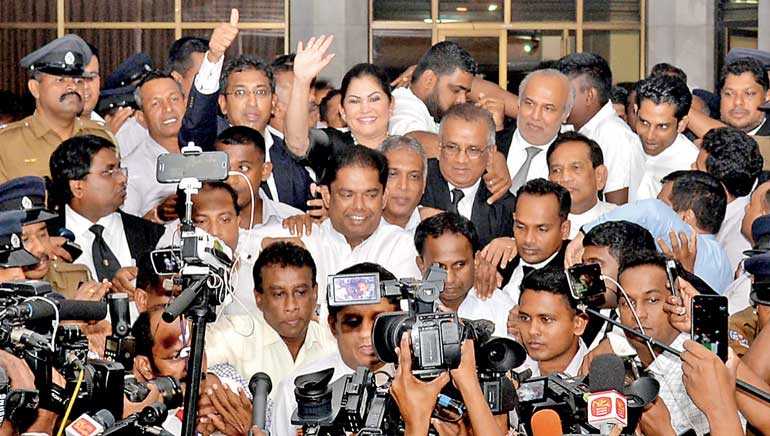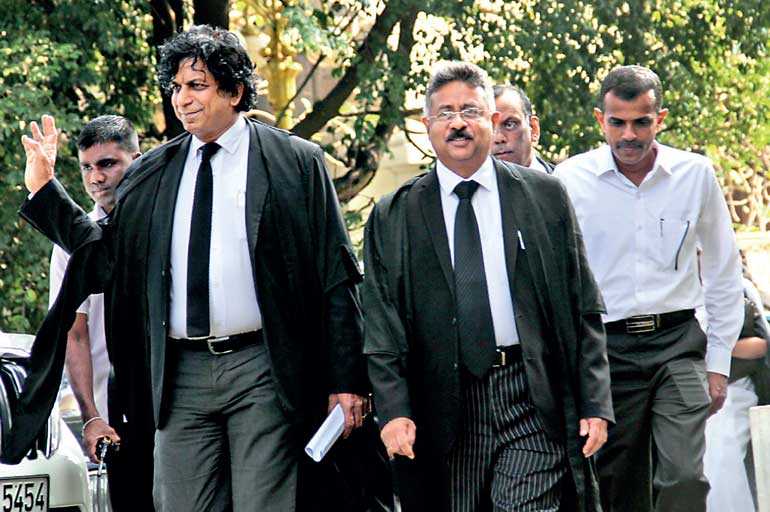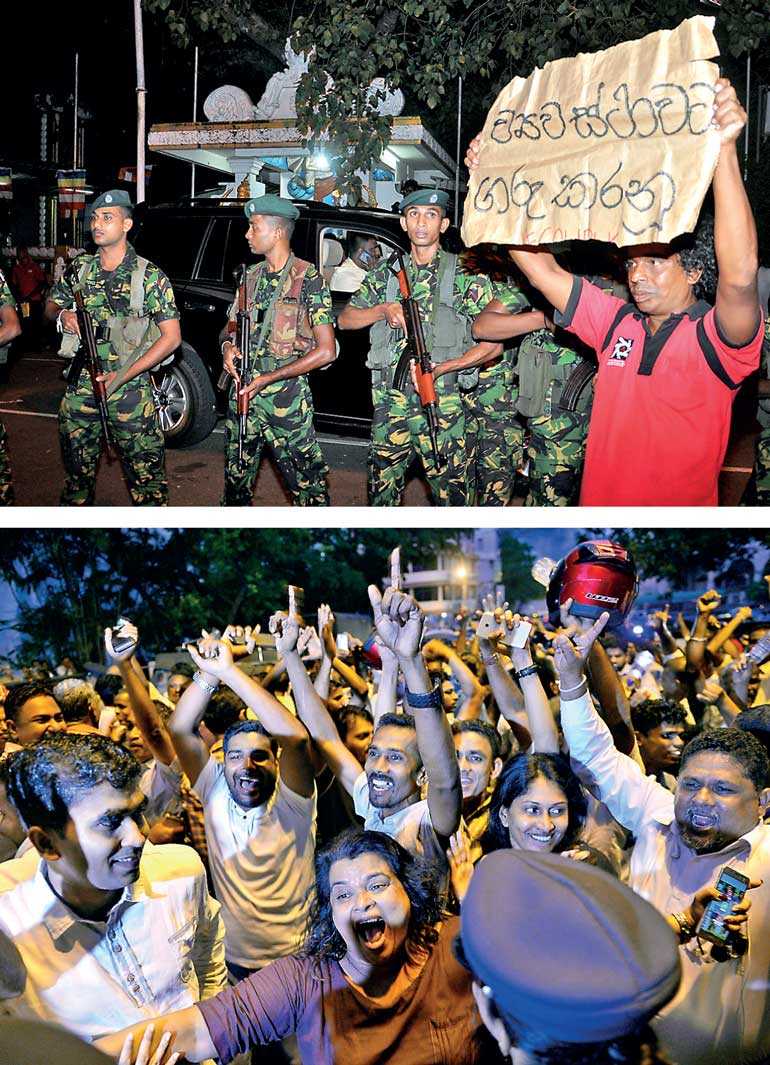Saturday Feb 21, 2026
Saturday Feb 21, 2026
Wednesday, 14 November 2018 00:00 - - {{hitsCtrl.values.hits}}
 United National Party members and civil society leaders celebrate at Hulftsdorp following the ruling by the Supreme Court yesterday - Pic by Romesh Dhanushka
United National Party members and civil society leaders celebrate at Hulftsdorp following the ruling by the Supreme Court yesterday - Pic by Romesh Dhanushka
By Chathuri Dissanayake
Emotions ran high as the three-judge bench ofthe Supreme Court yesterday delivered a landmark decision, issuing a stay order on the gazette dissolving Parliament issued by President Maithripala Sirisena until7December.
The decision, delivered at around 5.45p.m. in the evening after a gruelling 45 minutes of uncertainty, was heard in pin-drop silence with lawyers, politicians and journalists alike straining to hear every word uttered by Chief Justice Nalin Perera. The three-judge bench, led by the Chief Justice, comprising justices Prasanna Jayawardane and Priyantha Jayawardane, yesterday heard out lawyers for the second day, only breaking at 3.00 p.m. before a decision was delivered.
Visibly moved by the victory, Counsel M.A. Sumanthiran hailed the order as “the most important decision the Supreme Court has delivered in its history”.
The Parliamentarian, who appeared for Petitioner Champika Fernando, confidently said that Parliament’s business could now go on as the gazette dissolving Parliament had been suspended and the previous gazette that the President issued reconvening Parliament was now active.
“Parliament will meet tomorrow at 10.00 a.m.,” a confident Sumanthiran told Daily FT. The Speaker’s office later confirmed Parliament would reconvene today at 10.00 a.m., preceded by a party leaders’ meeting at 8.00 a.m.
Welcoming the decision given by the bench, President Counsel K. Kanag-Iswaran said that “the decision given agrees with the submissions of the petitioners that the President had no authority to dissolve Parliament with the gazette.”
“It was held in our favour that he [President] acted without jurisdiction, and the provisions in the Constitution that he had relied on cannot be the basis on which Parliament can be dissolved and consequently while the court proceeds to examine the case fully, because of the emergency and because of the fact that the dissolution was fundamentally flawed, they have suspended the dissolution until 7December,” he said.
“It is a landmark decision which declares democracy a winner,” a jubilant President Counsel Kanag-Iswaranasserted.
The bench, who sat for the second day, first heard the submissions of Attorney General Jayantha Jayasuriya, who appeared on behalf of President Maithripala Sirisena and intervening petitioners.
In defending the position taken by the President in dissolving Parliament, the AG and Counsel for intervening petitioners supporting the move as being legal said that the President had broad and “unfettered” powers to dissolve Parliament under Article 33 (2) (c) of the Constitution.
The Counsel, arguing over the legality of President’s actions, said that 33 (2) (c) was a standalone provision and the “plenary” or broad power vested in the President by the Constitution in fact added more powers to the office of the President and had not curtailed it as was believed to have been done through the 19th Amendment to the Constitution.
AG Jayasuriya accepted that he was acting on the instructions of the President, but strongly denied the charge that his points of law to make the arguments were being influenced by the Executive. However, Counsel Sumanthiran later pointed out that although the AG deemed it inappropriate to give an opinion when the legislature asked him for an opinion, he “has no trouble arguing for the Executive”, noting that the AG had been cited twice in the petitions, first as representative of the President but also in his official capacity as Attorney General. The AG holds a unique position of being empowered to proffer legal counsel to all three branches of the state, he noted.
The AG also told court that if interim relief was granted this would be tantamount to the suspension of the Constitution since the process to hold elections and allow the people to exercise their sovereignty was already in motion.
He also argued that Article 33 (2) (c) should be “de-linked” from the special provision 70 (1) which sets out his specific powers of dissolution of Parliament, a position backed by senior counsel representing intervening petitioners.
Lawyers defending the President’s actions urged the Court to consider the “breakdown in governance” and the situation under which the President was compelled to dissolve Parliament.
Following his submissions, the AG was asked two questions by Supreme Court Justice Prasanna Jayawardane - first, whether if it was the duty of the Court to uphold the Constitution and second whether the court needed to concern itself with the consequences of its ruling.
The hearings, which went on until 3.00 p.m.in the afternoon with only a 15-minute break - also heard counterarguments which all noted that no provisions in any statutes were “standalone” and the interpretation was usually of a statute as a whole.
Levelling a strong counter to the defence of the President’s actions presented by the AG and Counsel of intervening petitioners, Hejaz Hisbullah, appearing for petitioner R. Hoole, noted that reading Article 33 (2)(C) as a “standalone does not make sense and is extremely dangerous and could mean the end of democracy in the country.”
Adding to the counterarguments, PC Kanag-Iswaran said the arguments given by the lawyers defending the gazette were a “semantic, syntactic dismemberment of the Constitution” by claiming that Article 33 (2) (c) was a “standalone” provision.
Tilak Marapana PC, who was appearing for the UNP and Prime Minister Ranil Wickremesinghe, said the President’s lawyers were arguing that 33 (2) (c) gave him untrammelled and uncontrolled power which means he could even dissolve the House when there was a motion of impeachment moved against him.

 Supporters of ousted Prime Minister Ranil Wickremesinghe shout slogans outside the Supreme Court in Colombo yesterday. The Supreme Court yesterday overruled President Maithripala Sirisena’s dissolution of Parliament in a major boost to sacked Prime Minister Ranil Wickremesinghe’s fight to reclaim the post from an archrival - Pic by Lakruwan Wanniarachchi (AFP)
Supporters of ousted Prime Minister Ranil Wickremesinghe shout slogans outside the Supreme Court in Colombo yesterday. The Supreme Court yesterday overruled President Maithripala Sirisena’s dissolution of Parliament in a major boost to sacked Prime Minister Ranil Wickremesinghe’s fight to reclaim the post from an archrival - Pic by Lakruwan Wanniarachchi (AFP)